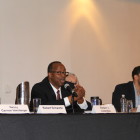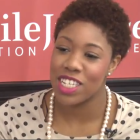
OP-ED: President’s Budget Includes Crucial Funding for Juvenile Justice
|
This year, President Barack Obama's budget reflects more of the juvenile justice field's priorities than ever before. These funding proposals will be crucial in advancing juvenile justice reforms in a number of ways. The Juvenile Justice and Delinquency Prevention Act (JJDPA) has provided critical federal funding for nearly 40 years, under the Title II formula grant funds, to states to comply with a set of minimum requirements designed to protect children and meet their unique needs. The president’s budget includes $70 million under Title II for states to utilize in keeping status offenders from being detained, removing children from adult jails and lock ups, and reducing the disparate treatment of youth of color in the juvenile justice system. The “deinstitutionalization of status offenders” or “DSO provision,” applies to young people whose actions would not be considered offenses at the age of majority, such as skipping school, running away, breaking curfew and possession or use of alcohol.










